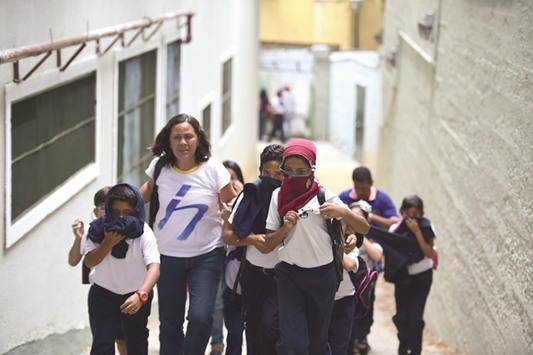Venezuelan protesters took to the streets yesterday for a high-risk march against President Nicolas Maduro, sparking fears of fresh violence after demonstrations that have left 26 dead in the crisis-wracked country.
Heavily armed police and soldiers blocked the main roads into Caracas, and all subway stations were closed, causing traffic chaos in the capital.
The opposition began gathering at rally points around the city and planned to march on central Caracas, a pro-Maduro bastion where the seat of government is located.
Previous attempts to reach the city centre have degenerated into clashes between riot police and stone-throwing protesters.
Senior opposition leader Henrique Capriles accused the authorities of “savage repression.”
“We are going to resist. We are going to persist. We will not surrender,” he said.
The centre-right opposition blames Maduro for severe shortages of food, medicine and other essentials in the oil-rich country, and wants general elections to exit the crisis.
Twenty-six people including four minors have died in violence sparked by the current wave of protests, which began on April 1, according to the attorney general.
Maduro put the figure at 29 deaths, without giving details.
“We will defeat violence and this coup d’etat,” he said in a speech on Tuesday.
The ruling socialist party called on Maduro’s supporters to stage their own “revolutionary youth” march to the presidential palace.
Maduro, the heir of the leftist “Bolivarian revolution” launched by the late Hugo Chavez in 1999, says the shortages and the protests are part of a US-backed plot to topple him.
The crisis deepened late last month when the Supreme Court moved to seize power from the National Assembly, the only lever of state authority Maduro and his allies do not control.
The court partly backtracked after an international outcry.
But the opposition was further galvanised when authorities banned Capriles from politics.
In just under a month of unrest, more than 400 people have been injured, and nearly 1,300 arrested, the attorney general said.
That includes 14 arrested journalists, their union said Tuesday, condemning the figure as “alarming.”
More than 100 journalists have been assaulted while covering the protests, it added, accusing the national guard of “harassing, beating and intimidating” reporters.
Watchdog group Reporters Without Borders yesterday ranked Venezuela 137th out of 180 countries in its World Press Freedom Index.
Rights group Amnesty International for its part urged the government to stop the “persecution” and “arbitrary detention” of protesters.
The opposition accuses the government of using the security forces to repress peaceful protests, and of sending armed thugs to attack them.
The government in turn accuses the opposition of paying armed agitators to stir up violence.
The Organization of American States meanwhile called an extraordinary meeting on the Venezuelan crisis.
OAS secretary general Luis Almagro has previously described Maduro as a “dictator.”
Venezuelan Foreign Minister Delcy Rodriguez, however, warned that Maduro has given orders to begin the process of withdrawing from the regional group if the OAS ups the ante by calling a meeting of foreign ministers to discuss the Venezuelan crisis.

Schoolchildren cover their noses and mouths to avoid breathing teargas shot by police in Caracas yesterday.
